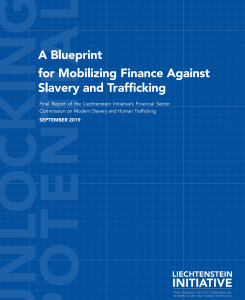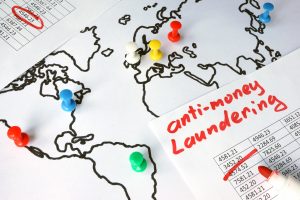more than 1000 times the population of Lichtenstein
to be freed to end slavery by 2030
 The European Banking Federation (EBF) is collaborating with the Liechtenstein Initiative for Finance Against Slavery and Trafficking (FAST) to raise awareness and mobilize our members against modern slavery and human trafficking. FAST has worked with a number of EBF members, including the Liechtenstein Bankers Association – one of its project partners – the Dutch Banking Association and the Swiss Bankers Association to help financial institutions access practical tools to use in this effort.
The European Banking Federation (EBF) is collaborating with the Liechtenstein Initiative for Finance Against Slavery and Trafficking (FAST) to raise awareness and mobilize our members against modern slavery and human trafficking. FAST has worked with a number of EBF members, including the Liechtenstein Bankers Association – one of its project partners – the Dutch Banking Association and the Swiss Bankers Association to help financial institutions access practical tools to use in this effort.
 There are an estimated 40.3 million people in modern slavery, despite a blanket global ban on such practices. To bring this figure close to zero by 2030 – to meet the UN Sustainable Development Goals Target 8.7 – we would need to reduce the number of people affected by over 10,000 people a day. But modern slavery is big business, with forced labour alone generating an estimated USD 150 billion dollars in illicit revenue per year. In the wake of the COVID-19 pandemic, risks of vulnerability to modern slavery and human trafficking are likely to rise even further.
There are an estimated 40.3 million people in modern slavery, despite a blanket global ban on such practices. To bring this figure close to zero by 2030 – to meet the UN Sustainable Development Goals Target 8.7 – we would need to reduce the number of people affected by over 10,000 people a day. But modern slavery is big business, with forced labour alone generating an estimated USD 150 billion dollars in illicit revenue per year. In the wake of the COVID-19 pandemic, risks of vulnerability to modern slavery and human trafficking are likely to rise even further.
This, in turn, will increase anti-money laundering, compliance and reputational risks for financial institutions connected to modern slavery and human trafficking harm through their own operations, or their business relationships. This may include use of payment systems to pay for goods and services generated through modern slavery or human trafficking, laundering the proceeds of these crimes, or lending to or investing in businesses with such links.
Financial sector efforts to address modern slavery risks will have an important influence in other business sectors. The financial sector has a unique opportunity to lead the transformation of our economies to exclude modern slavery and human trafficking risks, investing in and fostering business practices that help end modern slavery and human trafficking.
 FAST is a public-private partnership between the Governments of Liechtenstein, along with Australia and the Netherlands, United Nations University Centre for Policy Research – acting as its Secretariat – and Liechtenstein private and civil society groups, including the Liechtenstein Banking Association.
FAST is a public-private partnership between the Governments of Liechtenstein, along with Australia and the Netherlands, United Nations University Centre for Policy Research – acting as its Secretariat – and Liechtenstein private and civil society groups, including the Liechtenstein Banking Association.
 The FAST Blueprint provides a collective action framework for the whole financial sector and professional service providers to accelerate action to end modern slavery and human trafficking. FAST aims to encourage implementation of the Blueprint by the financial sector and stakeholders. Through holding and participating in global convenings, identifying lessons learned and through a partnership with key stakeholders such as EBF, FAST looks to encourage uptake of the Blueprint in enterprise and market-level implementation.
The FAST Blueprint provides a collective action framework for the whole financial sector and professional service providers to accelerate action to end modern slavery and human trafficking. FAST aims to encourage implementation of the Blueprint by the financial sector and stakeholders. Through holding and participating in global convenings, identifying lessons learned and through a partnership with key stakeholders such as EBF, FAST looks to encourage uptake of the Blueprint in enterprise and market-level implementation.
The initiative is housed at United Nations University Centre in New York, an independent thinktank within the UN system. It combines research excellence with deep knowledge of the multilateral system to generate innovative solutions to current and future global public policy challenges.
 As part of the Blueprint to mobilize the financial sector against modern slavery and human trafficking, Finance Against Slavery and Trafficking (FAST) has identified five goals towards which financial sector actors can work through individual and collective action. These include:
As part of the Blueprint to mobilize the financial sector against modern slavery and human trafficking, Finance Against Slavery and Trafficking (FAST) has identified five goals towards which financial sector actors can work through individual and collective action. These include:
Goal 1: Compliance with laws against modern slavery and human trafficking.
Goal 2: Knowing and showing modern slavery and human trafficking risks.
Goal 3: Using leverage creatively to mitigate and address modern slavery and human trafficking risks.
Goal 4: Providing and enabling effective remedy for modern slavery and human trafficking harms.
Goal 5: Investment in innovation for prevention.
Each Goal is accompanied by three ‘Act Now’ measures for immediate action, and three ‘Initiate’ actions to be implemented over a longer course of time. The Implementation Toolkit assists with the implementation of the Blueprint and includes a Connection Diagnostic and Risk Mapping Tool, to help identify modern slavery and human trafficking risks with illustrative examples that help financial sector actors begin to understand identified connections to modern slavery and human trafficking, and a Financial Investigations Tool, providing guidance on good practice in conducting financial investigations into modern slavery and human trafficking.
Having endured exploitation, survivors may find that traffickers have hijacked their financial identity or banking products for money-laundering or other criminal purposes, spoiling their credit record and complicating financial reintegration. To help address this, another FAST project, the Survivor Inclusion Initiative, works with leading banks to help survivors of modern slavery and human trafficking find safe and reliable access to basic financial products and services.
Strengthening compliance with anti-money laundering and counter-terrorist financing (AML/CFT) regimes is outlined as a key action in the Blueprint. In February 2020, FAST announced the launch of a strategic partnership with the largest international membership organization of financial crime prevention professionals, the Association of Certified Anti-Money Laundering Specialists, to further mobilize professionals working in this field against modern slavery and human trafficking. In June 2020 ACAMS and FAST launched an Official Pledge in support of FAST, encouraging ACAMS’ 80,000 strong membership community in 175 countries and 70 chapters worldwide to commit to taking action in line with the Blueprint.
![]() One way to do this is by completing the FAST/ACAMS online Human Trafficking training certificate, the first such online training course freely available to financial sector professionals and the broader public globally. The course provides an introduction to the steps that financial sector actors should take to meet the growing requirements to identify, report, mitigate and remedy modern slavery and human trafficking risks. It covers anti-money laundering and countering the financing of terrorism obligations; environmental, social and governance (ESG) factors, and human rights and enterprise risk management. It draws on insights from industry leaders and recent cases
One way to do this is by completing the FAST/ACAMS online Human Trafficking training certificate, the first such online training course freely available to financial sector professionals and the broader public globally. The course provides an introduction to the steps that financial sector actors should take to meet the growing requirements to identify, report, mitigate and remedy modern slavery and human trafficking risks. It covers anti-money laundering and countering the financing of terrorism obligations; environmental, social and governance (ESG) factors, and human rights and enterprise risk management. It draws on insights from industry leaders and recent cases
The course explains how financial sector stakeholders can work to strengthen compliance with AML/CFT laws to address modern slavery and human trafficking risks. These already extend in most jurisdictions to handling funds generated from modern slavery or human trafficking, though that is not always made explicit by regulators. Where this has been made explicit, for example through specific guidance on these risks or asking questions in Suspicious Activity Reporting forms, up to a 1,000 per cent increase in reporting has ensued. Stronger compliance with AML/CFT rules will also come about through devoting more resources to financial investigations. Transaction analysis tools need to be developed to deal not just with forms of modern slavery in the developed world, such as cross-border sex trafficking, but also those that take place in the developing world, such as debt bondage and domestic servitude.
modern slavery and human trafficking risks. These already extend in most jurisdictions to handling funds generated from modern slavery or human trafficking, though that is not always made explicit by regulators. Where this has been made explicit, for example through specific guidance on these risks or asking questions in Suspicious Activity Reporting forms, up to a 1,000 per cent increase in reporting has ensued. Stronger compliance with AML/CFT rules will also come about through devoting more resources to financial investigations. Transaction analysis tools need to be developed to deal not just with forms of modern slavery in the developed world, such as cross-border sex trafficking, but also those that take place in the developing world, such as debt bondage and domestic servitude.
Other actions proposed by the Blueprint concerning AML/CFT include:
 financial investigation of modern slavery and human trafficking, commensurate with the scale and gravity of the problem. Regulators, financial intelligence units (FIUs) and private-sector actors should work together to develop better indicators of AML/CFT risks associated with current and emerging forms of modern slavery and human trafficking.
financial investigation of modern slavery and human trafficking, commensurate with the scale and gravity of the problem. Regulators, financial intelligence units (FIUs) and private-sector actors should work together to develop better indicators of AML/CFT risks associated with current and emerging forms of modern slavery and human trafficking.